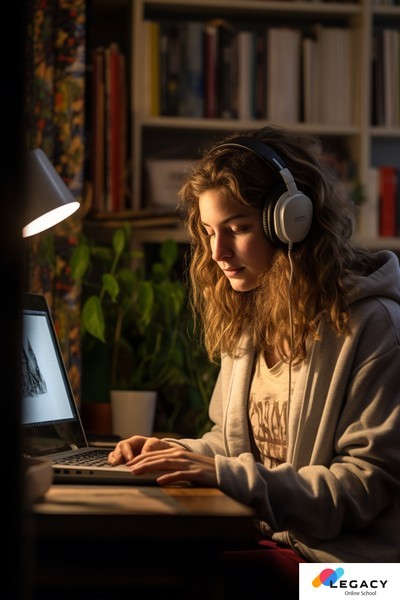The content of the publication
The digital age has revolutionized many sectors and education is no exception. With the rise of online schools, students worldwide now have access to many courses and resources at their fingertips. But what’s it like to be a student in an online school? Let’s embark on a journey to understand the student experience in online schools from various angles.
Student Experience in Online Schools: A New Dawn
The emergence of online schools has been nothing short of a revolution in the vast realm of education. It’s a paradigm shift that has redefined the boundaries of learning, making education more accessible and tailored to individual needs. As we navigate through this digital age, it’s essential to understand the multifaceted student experience in online schools.
The Allure of Online Education
Online schooling, at its core, is about breaking barriers. Gone are the days when geographical constraints or personal commitments could hinder one’s educational journey. Today, a student in Tokyo can learn from a professor in New York, all while wearing pajamas in the comfort of their home.
Flexibility: One of the most significant advantages of online learning is flexibility. Traditional brick-and-mortar schools operate on fixed schedules, which can sometimes clash with a student’s other commitments, be it a part-time job, a hobby, or family responsibilities. Online schools, on the other hand, often allow students to access lectures and materials at any time. This flexibility ensures that education molds itself around the student’s life, not vice versa.
Diverse Course Offerings: The digital realm is vast, as are online school course offerings. Whether you’re passionate about ancient history, quantum physics, digital marketing, or abstract art, there’s a course for you. This diversity ensures that students can pursue their passions, no matter their niche.
Global Interaction: One of the most enriching aspects of online schools is the opportunity for global interaction. In a virtual classroom, a student from India might work on a group project with peers from Brazil, South Africa, and Canada. This melting pot of cultures and perspectives fosters a global mindset, preparing students for an increasingly interconnected world.
The Flip Side: Challenges in Online Learning
While online schooling offers numerous benefits, it’s not without its challenges. The lack of face-to-face interaction can sometimes lead to feelings of isolation. There’s also the challenge of self-discipline; procrastination can creep in without the structured environment of a traditional classroom. Technical issues, from unreliable internet connections to software glitches, can also disrupt learning.
However, it’s worth noting that many online schools are actively addressing these challenges. Virtual group activities, discussion forums, and mentorship programs are being implemented to combat feelings of isolation. Meanwhile, many online resources, from time management workshops to tech support, ensure that students have the tools they need to succeed.
Firsthand Accounts: Stories from the Digital Classroom
In the vast realm of online education, students from diverse backgrounds come together in a digital space, each with a unique story to tell. While lacking the tangible essence of brick and mortar, the digital classroom is rich with experiences, challenges, and triumphs. Here are some firsthand accounts from students who have navigated the world of online schooling.
Elena’s Journey: From Skepticism to Advocacy
Elena, a 17-year-old from Madrid, was initially skeptical about online schooling. “I was so used to the traditional classroom setting, the idea of attending school from my bedroom seemed absurd,” she recalls. However, her perspective shifted a few months into her online high school program. “The flexibility allowed me to delve deeper into subjects I was passionate about. I could pause a lecture, do my research, and then continue. It felt like I was in control of my education.” Today, Elena advocates online education and believes it’s the future of learning.
Ravi’s Tale: Bridging Cultural Gaps
Ravi, hailing from a small village in India, has always dreamt of studying advanced computer science. But with limited resources and institutions in his vicinity, his dream seemed distant. That’s when he discovered an online course offered by a renowned university in the USA. “It wasn’t just the quality of education that amazed me, but also the diversity. I was discussing algorithms with someone from Brazil and debugging code with a friend from Egypt!” For Ravi, online schooling was more than just education; it was a cultural exchange.
Sophie’s Story: Overcoming Challenges
Sophie, a student with an auditory processing disorder, often found traditional classrooms overwhelming. “The noise, the pace at which teachers spoke, it was all too much,” she shares. Online schooling came as a blessing. “I could replay lectures, use subtitles, and learn comfortably.” With the support of online resources and understanding instructors, Sophie excelled academically and gained confidence in her abilities.
Liam’s Experience: Balancing Act
For Liam, a budding tennis player, traditional schooling was a hurdle in his training. “I had to miss school for tournaments, and catching up was a nightmare,” he says. Switching to online schooling provided the balance he desperately sought. “I could attend lectures from hotel rooms or even airports. My school traveled with me!” With online schooling, Liam could pursue his passion for tennis without compromising his education.
Sarah, a high school senior, shares, “Online schooling allowed me to pursue my passion for ballet alongside academics. But sometimes, I miss the chatter and laughter of a traditional classroom.” On the other hand, Raj, an international student, found solace in online learning, “I could connect with my roots by choosing courses related to my culture.”
The Role of Teachers in Online Schools
In the vast digital landscape of online education, teachers emerge as the guiding beacons, illuminating the path for students navigating the complexities of virtual learning. Their role in online schools is multifaceted, demanding, and, quite frankly, revolutionary. As education undergoes this digital transformation, the role of teachers has evolved, adapting to the unique challenges and opportunities presented by online platforms.
Adapting to the Digital Frontier
The transition from traditional classrooms to online platforms is not merely about shifting from a blackboard to a screen. It requires teachers to undergo a metamorphosis in their teaching methodologies. They must familiarize themselves with various digital tools, from learning management systems to interactive quizzes, ensuring that their lessons are as engaging online as they would be in a physical classroom.
Moreover, teachers in online schools often become tech troubleshooters. They assist students with technical glitches, ensuring technology enhances the learning experience rather than hindering it. This added responsibility showcases their commitment to ensuring every student has an uninterrupted learning journey.
Creating a Virtual Community
One of the primary challenges of online education is the potential feeling of isolation among students. Here, teachers play a pivotal role in fostering a sense of community. They initiate discussions, encourage peer interactions, and create collaborative projects, ensuring students feel connected despite the physical distance.
Furthermore, teachers become the emotional anchors for students. Recognizing that the virtual environment can sometimes feel impersonal, they make concerted efforts to understand each student’s needs, challenges, and aspirations. They provide feedback, offer encouragement, and sometimes lend a listening ear, ensuring every student feels seen and heard.
Beyond Academics: The Holistic Approach
In online schools, the role of a teacher isn’t confined to academics. They become mentors, guiding students not just in their subjects but in life skills as well. They teach students how to manage their time effectively, sift through the vast amounts of information available online, and be responsible digital citizens. Essentially, they prepare students for a world where digital literacy is as crucial as any subject they teach.
Conclusion
The student experience in online schools is a tapestry of challenges and opportunities. While online schooling offers unparalleled flexibility and vast courses, it also demands self-discipline and adaptability. As technology continues to evolve, so will the landscape of online education, promising a brighter, more inclusive future for students worldwide.








